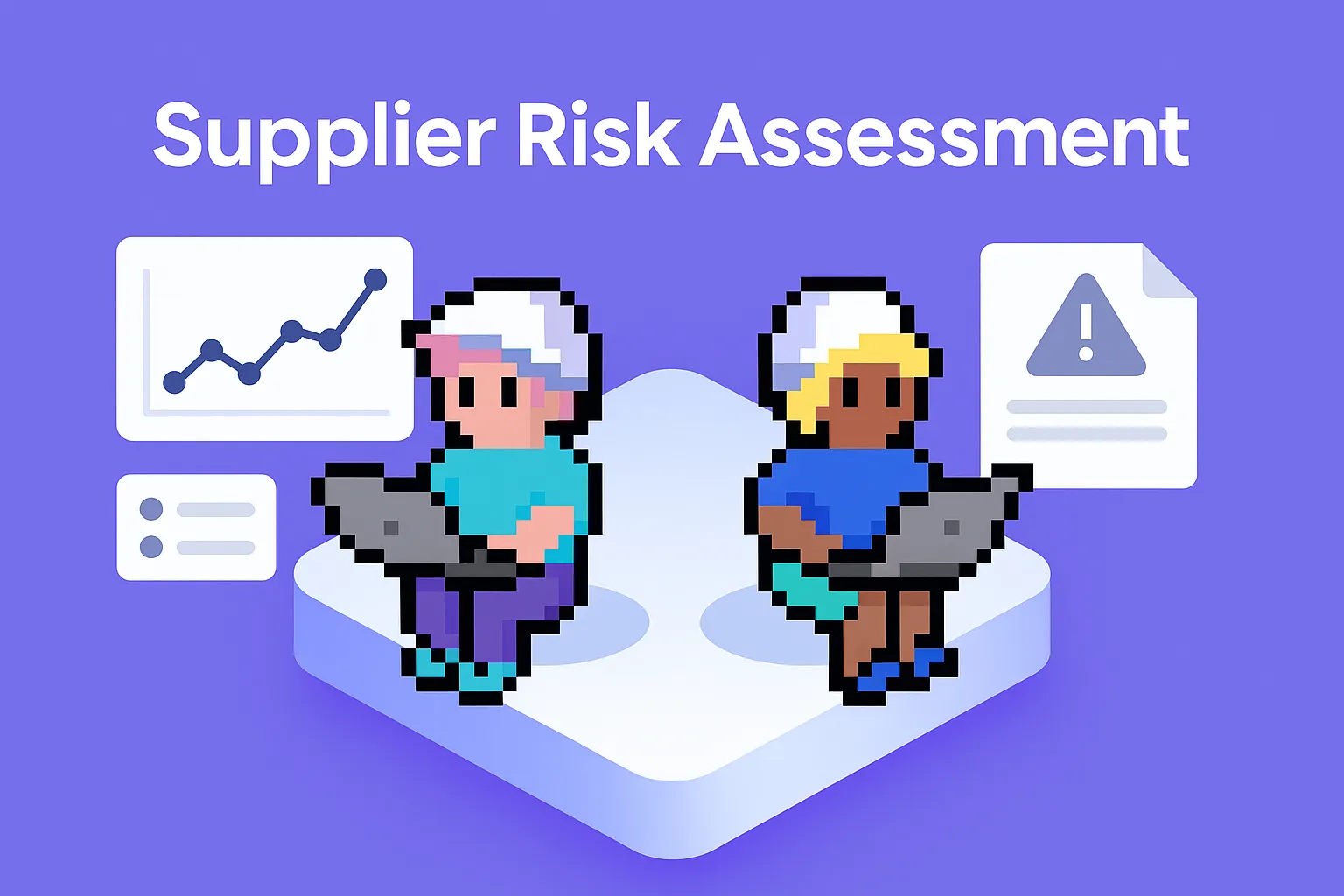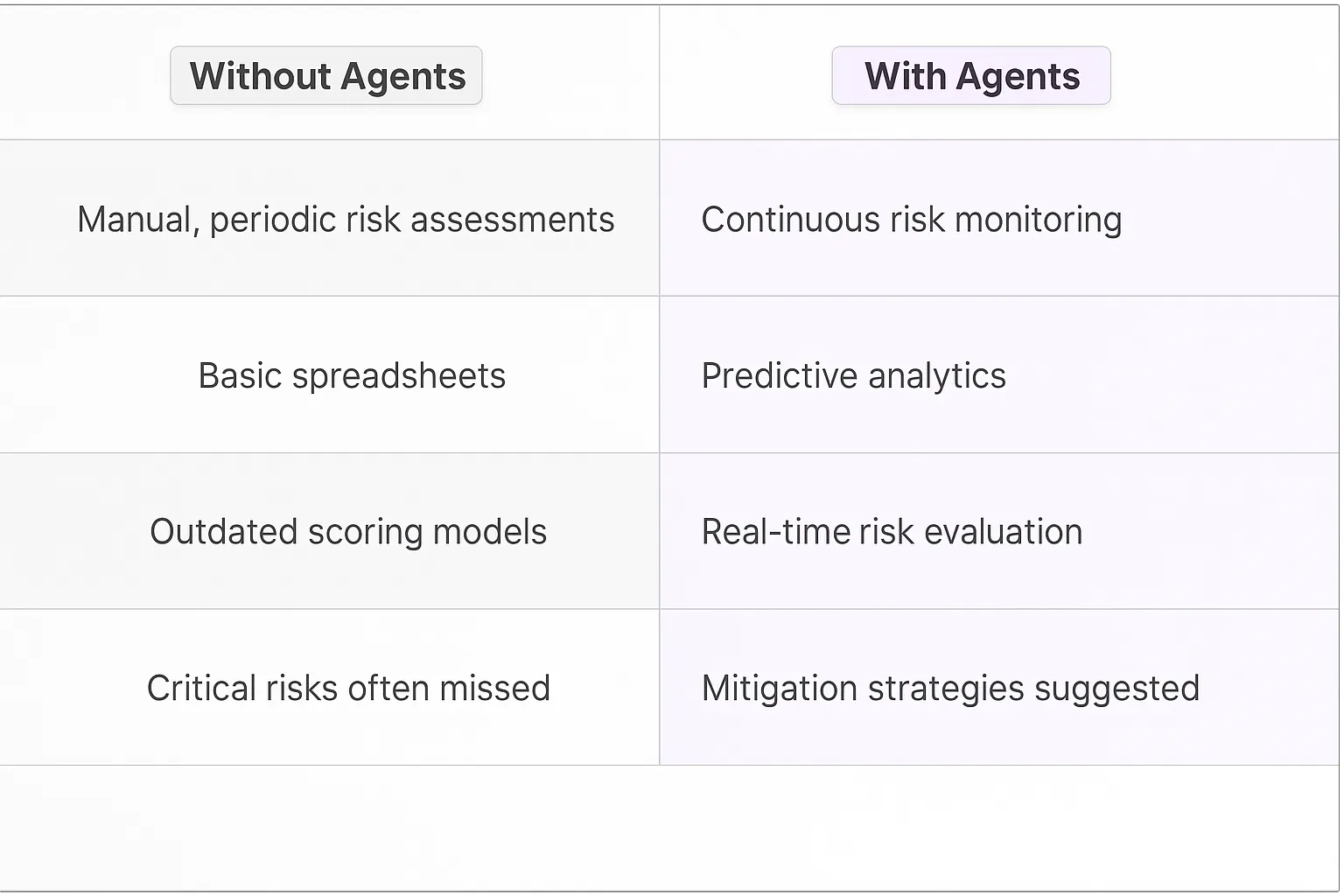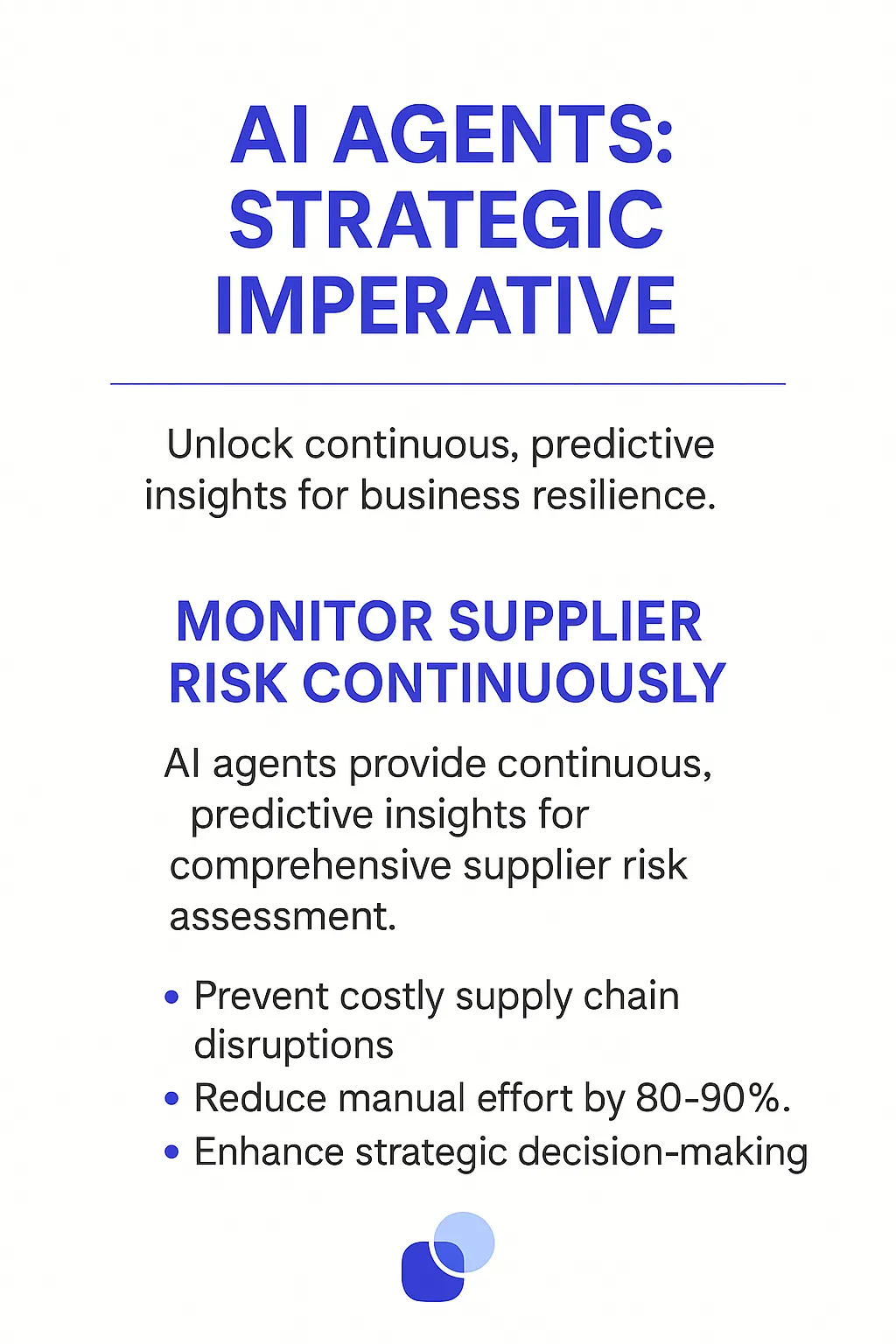Supplier Risk Assessment AI Agents
Understanding Supplier Risk Assessment and AI's Role
What is Supplier Risk Assessment?
Supplier Risk Assessment is the process of evaluating and monitoring potential risks associated with a company's suppliers. It's like playing high-stakes poker, where the chips are your supply chain's stability and your company's reputation. This process involves analyzing various factors such as financial health, operational capabilities, compliance with regulations, and geopolitical risks that could impact a supplier's ability to deliver goods or services.
Key Features of Supplier Risk Assessment
Supplier Risk Assessment isn't just about crunching numbers. It's a multi-faceted approach that includes:
- Financial analysis: Digging into balance sheets and cash flow statements to spot potential fiscal red flags.
- Operational assessment: Evaluating a supplier's production capacity, quality control measures, and delivery track record.
- Compliance checks: Ensuring suppliers adhere to relevant laws, regulations, and industry standards.
- Geopolitical risk evaluation: Considering how global events might disrupt supply chains.
- Continuous monitoring: Keeping a vigilant eye on suppliers' performance and external factors that could impact them.
With AI agents, these features are supercharged. They're not just checking boxes; they're connecting dots across vast datasets, spotting patterns that human analysts might miss, and providing predictive insights that can help companies stay ahead of potential disruptions.

Benefits of AI Agents for Supplier Risk Assessment
What would have been used before AI Agents?
Before AI agents entered the scene, supplier risk assessment was a painstaking process that relied heavily on manual labor and outdated tools. Companies would typically employ teams of analysts to pore over spreadsheets, financial reports, and news articles. They'd use basic risk scoring models that often failed to capture the nuanced complexities of global supply chains. It was like trying to predict the weather with a barometer and a wet finger in the air – you might get the general idea, but you'd miss the storm brewing on the horizon.
What are the benefits of AI Agents?
Enter AI agents for supplier risk assessment, and suddenly we're playing a whole new ballgame. These digital teammates are like having a team of tireless, hyper-intelligent risk analysts working 24/7. They're not just crunching numbers; they're connecting dots across vast datasets that human analysts could never hope to process in a lifetime.
First off, AI agents bring unprecedented speed and scale to the table. They can analyze thousands of suppliers in minutes, not months. This isn't just about efficiency; it's about staying ahead of risks that can evolve in real-time. In the fast-moving world of global supply chains, that speed can mean the difference between a minor hiccup and a major crisis.
But speed is just the appetizer. The main course is the depth and breadth of analysis these AI agents can perform. They're not just looking at financial statements; they're scanning news articles, social media feeds, and even satellite imagery to build a comprehensive risk profile. They can spot subtle patterns and correlations that might escape even the most eagle-eyed human analyst. It's like going from a magnifying glass to an electron microscope in terms of detail and insight.
Perhaps most importantly, AI agents bring a level of objectivity and consistency to risk assessment that's hard to achieve with human analysts. They're not swayed by personal biases or gut feelings. They apply the same rigorous analysis to every supplier, every time. This consistency is crucial for building trust in the risk assessment process, both internally and with external stakeholders.
The real game-changer, though, is the predictive power of these AI agents. They're not just telling you about risks that exist today; they're forecasting potential issues down the road. By analyzing historical data and current trends, they can flag suppliers that might be heading for trouble before any red flags appear in traditional metrics. It's like having a crystal ball for your supply chain.
Finally, these AI agents are learning machines. Every assessment they perform makes them smarter and more accurate. They're constantly refining their models based on new data and outcomes. This means your risk assessment capabilities aren't static – they're evolving and improving over time, keeping pace with the ever-changing landscape of global supply chains.
In essence, AI agents for supplier risk assessment aren't just tools; they're transformative technologies that are redefining how companies understand and manage supply chain risk. They're turning what was once a reactive, rearview mirror approach into a proactive, forward-looking strategy. And in today's complex, interconnected business world, that's not just an advantage – it's a necessity.
One of the most powerful capabilities is predictive risk modeling, which allows companies to anticipate and prepare for potential disruptions before they occur.

Potential Use Cases of AI Agents for Supplier Risk Assessment
Processes
Supplier risk assessment is a critical process that can make or break a company's supply chain. AI agents are poised to transform this traditionally manual and time-consuming task into a data-driven powerhouse. These digital teammates can continuously monitor and analyze vast amounts of data from multiple sources, providing real-time insights that human analysts might miss.
One key process where AI agents shine is in the initial supplier vetting. They can rapidly sift through financial reports, news articles, and social media mentions to build a comprehensive risk profile for each potential supplier. This isn't just about speed - it's about depth and breadth of analysis that goes beyond human capabilities.
Another critical process is ongoing supplier performance monitoring. AI agents can track key performance indicators (KPIs) in real-time, flagging any deviations from expected norms. This proactive approach allows companies to address potential issues before they escalate into major problems.
Tasks
When it comes to specific tasks, AI agents are game-changers in supplier risk assessment. They can perform sentiment analysis on supplier communications, detecting subtle shifts in tone that might indicate underlying issues. This level of nuanced understanding was previously the domain of experienced human analysts, but AI is now pushing the boundaries of what's possible.
Financial health assessment is another task where AI agents excel. They can crunch numbers from financial statements, credit reports, and market data to provide a holistic view of a supplier's financial stability. But it doesn't stop there - these digital teammates can also factor in macroeconomic trends and industry-specific risks to provide a more contextualized assessment.
Compliance checking is a tedious but crucial task that AI agents handle with ease. They can continuously scan regulatory updates across multiple jurisdictions and cross-reference them with supplier data to ensure ongoing compliance. This not only reduces risk but also frees up human resources for more strategic tasks.
Perhaps one of the most exciting applications is in predictive risk modeling. AI agents can analyze historical data and current trends to forecast potential future risks. This forward-looking approach allows companies to be proactive rather than reactive in their risk management strategies.
The beauty of AI in supplier risk assessment lies in its ability to learn and improve over time. As these digital teammates process more data and receive feedback on their assessments, they become increasingly accurate and valuable. We're not just talking about automation here - we're talking about a fundamental shift in how companies understand and manage supplier risk.
In the world of supplier risk assessment, AI agents are not just tools; they're becoming indispensable partners. They're enabling companies to make faster, more informed decisions, and ultimately build more resilient supply chains. As the technology continues to evolve, we can expect to see even more sophisticated applications that push the boundaries of what's possible in risk management.

Industry Use Cases: Supplier Risk Assessment AI Agents
The versatility of AI agents in supplier risk assessment makes them valuable across various industries. Let's dive into some meaty, industry-specific use cases that show how AI can transform workflows and processes in ways you might not expect.
These digital teammates aren't just fancy spreadsheet jockeys. They're like having a team of risk analysts who never sleep, fueled by data and algorithms instead of coffee. They're constantly scanning the horizon for potential supplier issues, giving businesses a heads-up before problems snowball into crises.
But here's the kicker: these AI agents aren't just regurgitating data. They're connecting dots that humans might miss, spotting patterns across vast datasets, and providing insights that can shape strategic decisions. It's like having a crystal ball for your supply chain, but one that's powered by cold, hard data instead of mystical mumbo-jumbo.
The power of these systems lies in their ability to handle complex data aggregation from multiple sources, creating comprehensive risk profiles that would be impossible to compile manually.
So, let's roll up our sleeves and look at how these AI agents are shaking things up across different sectors. From manufacturing to healthcare, retail to tech, these use cases will show you how AI is redefining supplier risk assessment in ways that might just blow your mind.
Automotive Industry: Driving Efficiency with Supplier Risk Assessment AI Agents
The automotive industry is a complex ecosystem of manufacturers, suppliers, and distributors. With thousands of parts going into each vehicle, managing supplier risk is crucial. Enter Supplier Risk Assessment AI Agents – the digital teammates that are transforming how automakers handle their supply chain vulnerabilities.
These AI agents dive deep into the data ocean, analyzing everything from financial reports and geopolitical events to weather patterns and social media sentiment. They're not just skimming the surface; they're exploring the Mariana Trench of supplier data.
Let's say you're Tesla. You're ramping up production of your latest electric vehicle, and you need to ensure your battery suppliers can keep up. Your Supplier Risk Assessment AI Agent is constantly monitoring for potential disruptions. It flags that one of your key lithium suppliers in Chile is facing labor disputes. Before this escalates into a full-blown crisis, the AI agent has already:
- Calculated the potential impact on your production schedule
- Identified alternative suppliers with excess capacity
- Suggested optimal reallocation of orders to mitigate risk
- Drafted communication templates for stakeholders
But it doesn't stop there. The AI agent is also learning from each interaction, continuously refining its risk models. It's like having a supply chain expert who never sleeps, never takes a vacation, and gets smarter by the minute.
The result? You're not just reacting to supply chain disruptions; you're anticipating and neutralizing them before they can impact your bottom line. It's like playing chess while your competitors are still figuring out how to set up the board.
This isn't just about avoiding disasters; it's about unlocking new levels of efficiency. With AI agents handling the heavy lifting of risk assessment, your human team can focus on strategic decisions and relationship building. You're not just surviving in the cutthroat automotive industry; you're thriving.
The integration of predictive modeling capabilities allows these systems to anticipate demand fluctuations and supply constraints with remarkable accuracy.
Supplier Risk Assessment AI Agents in the automotive industry aren't just a nice-to-have; they're becoming as essential as the assembly line itself. They're the unsung heroes ensuring that when you hit that accelerator, your car doesn't just go from 0 to 60 – it does so with unparalleled reliability and efficiency.
Aerospace Industry: Navigating Supplier Risks with AI Precision
The aerospace sector isn't just about reaching for the stars; it's about managing a constellation of suppliers to keep those birds in the air. And let me tell you, it's a high-stakes game where a single faulty component can ground an entire fleet. This is where Supplier Risk Assessment AI Agents are becoming the secret weapon for aerospace giants.
Take Boeing, for instance. They're juggling hundreds of suppliers for each aircraft model. One hiccup in the supply chain, and you've got multi-million dollar planes sitting idle on the tarmac. That's where these AI agents come in, acting like digital bloodhounds sniffing out potential risks before they become headline news.
These AI agents are crunching numbers faster than a jet breaking the sound barrier. They're not just looking at obvious metrics like delivery times or quality control reports. They're diving into the nitty-gritty:
- Analyzing satellite imagery to spot potential natural disasters near key manufacturing sites
- Scraping social media to detect early signs of labor unrest
- Monitoring global commodity prices to predict material shortages
- Tracking geopolitical tensions that could disrupt international shipping routes
But here's where it gets really interesting. These AI agents aren't just passive observers. They're proactive problem solvers. When they detect a potential issue, they don't just raise a red flag and call it a day. They start gaming out scenarios and proposing solutions.
For example, let's say the AI detects that a key supplier of composite materials in Japan is at risk due to an approaching typhoon. Within minutes, it's not only alerting the procurement team but also:
- Calculating the exact impact on production schedules
- Identifying alternative suppliers with matching certifications
- Proposing temporary adjustments to the manufacturing process to use different materials
- Drafting contingency plans for expedited shipping from other locations
This isn't just risk mitigation; it's risk judo. You're turning potential disasters into opportunities to optimize your supply chain.
And here's the kicker: these AI agents are learning and evolving with every interaction. They're building a knowledge base that would make even the most seasoned supply chain veteran jealous. It's like having a team of experts working 24/7, constantly getting smarter and more efficient.
The sophisticated pattern recognition capabilities of these systems enable them to identify subtle correlations between seemingly unrelated events that could impact supply chain stability.
The result? Aerospace companies using these AI agents are seeing fewer delays, reduced costs, and improved reliability. They're not just building better planes; they're building a more resilient industry.
In the high-flying world of aerospace, Supplier Risk Assessment AI Agents aren't just tools; they're becoming as crucial as the engines powering the aircraft. They're the unsung heroes ensuring that when you look up at the sky, you see dreams taking flight, not nightmares of supply chain failures.
Considerations
Technical Challenges
Implementing a Supplier Risk Assessment AI Agent isn't just a plug-and-play solution. It's more like trying to teach a toddler quantum physics while juggling flaming torches. The first hurdle? Data integration. Your AI needs to feast on a smorgasbord of data from various sources - financial reports, news feeds, social media, and industry databases. But here's the kicker: this data is often as messy as a teenager's bedroom.
You'll need to build robust ETL (Extract, Transform, Load) pipelines that can handle data in various formats and qualities. It's like being a data janitor, but instead of a mop, you're wielding complex algorithms. And let's not forget about real-time processing. Your AI agent needs to be as quick as a cat on a hot tin roof, processing new information as it comes in to provide up-to-the-minute risk assessments.
Then there's the AI model itself. Training a model to accurately assess supplier risk is like teaching a computer to be a seasoned poker player. It needs to recognize patterns, understand context, and make judgments based on incomplete information. You'll need to experiment with different machine learning approaches - maybe deep learning for complex pattern recognition, or reinforcement learning for dynamic decision-making.
Operational Challenges
On the operational side, implementing a Supplier Risk Assessment AI Agent is like trying to perform heart surgery while the patient is running a marathon. First off, you've got the challenge of integrating this new system into existing procurement processes. It's not just about dropping in a new tool; it's about rewiring how your entire organization thinks about supplier risk.
You'll need to train your procurement team to work alongside this digital teammate. It's like teaching old dogs new tricks, except the dogs are seasoned professionals and the tricks involve interpreting AI-generated risk assessments. There's bound to be resistance - "We've always done it this way" is the battle cry of the change-averse.
Then there's the trust factor. How do you get your team to trust the AI's assessments? It's one thing to have a computer recommend a movie; it's another to have it influence million-dollar procurement decisions. You'll need to implement a system of checks and balances, perhaps keeping humans in the loop for high-stakes decisions.
Don't forget about the suppliers themselves. They might not be thrilled about being assessed by an AI. You'll need a solid communication strategy to explain the new system and address their concerns. It's like being a diplomat, but instead of negotiating treaties, you're selling the idea of AI-driven risk assessment.
Lastly, there's the ever-present specter of ethical considerations. Your AI needs to be fair and unbiased in its assessments. But AI can inherit and amplify human biases if we're not careful. It's like trying to raise a perfectly objective child in a world full of prejudices. You'll need to constantly monitor and adjust your AI to ensure it's making fair and ethical assessments.
The Future of Supply Chain Resilience: AI-Driven Risk Management
Supplier Risk Assessment AI Agents are more than just a technological upgrade; they're a paradigm shift in how companies manage supply chain risk. They're turning what was once a reactive, labor-intensive process into a proactive, data-driven strategy. These digital teammates are enabling companies to navigate the complexities of global supply chains with unprecedented speed, accuracy, and foresight.
But let's not kid ourselves - implementing these AI agents isn't a walk in the park. It comes with its own set of technical and operational challenges. From data integration hurdles to the need for cultural shifts within organizations, there's plenty of heavy lifting involved.
Yet, the potential rewards are too significant to ignore. In a world where supply chain disruptions can make or break a company, having AI agents that can predict and mitigate risks before they escalate is becoming less of a luxury and more of a necessity.
The development of comprehensive risk management strategies powered by AI is enabling organizations to build more adaptive and resilient operations that can withstand global uncertainties.
As we look to the future, it's clear that Supplier Risk Assessment AI Agents will play an increasingly crucial role in shaping resilient, adaptive supply chains. Companies that successfully integrate these digital teammates into their risk management strategies will find themselves not just surviving, but thriving in the face of supply chain uncertainties. The question isn't whether to adopt this technology, but how quickly you can get on board before your competitors leave you in the dust.
Building supply chain resilience through AI-driven risk assessment is no longer a competitive advantage—it's becoming a business imperative for companies operating in today's interconnected global marketplace.













